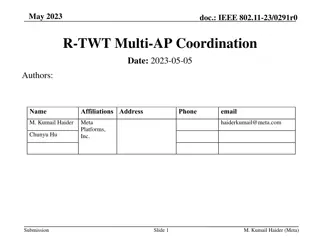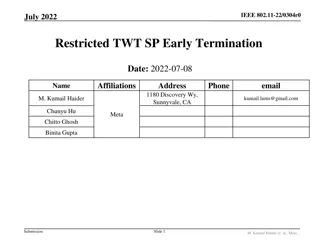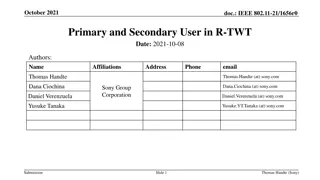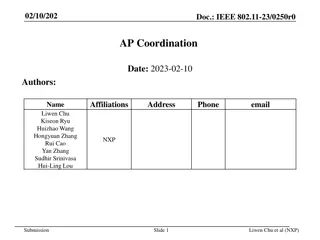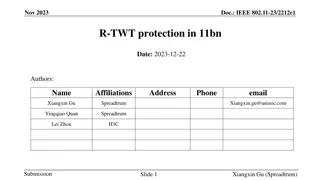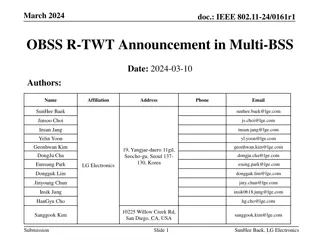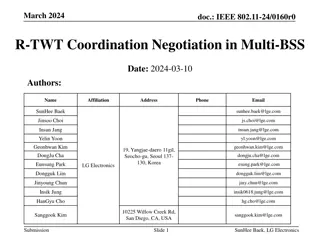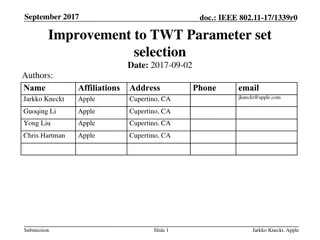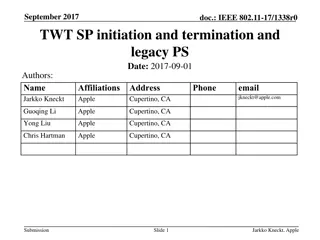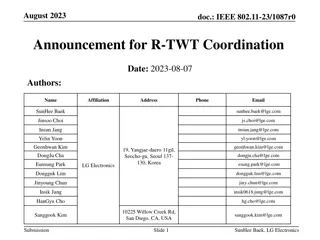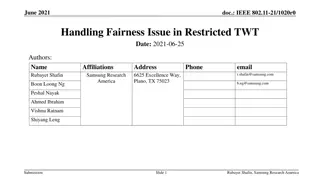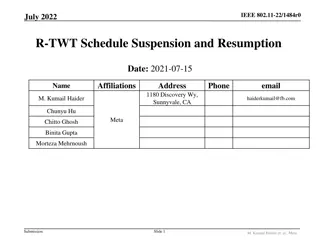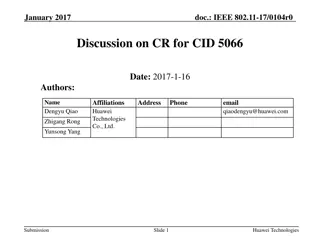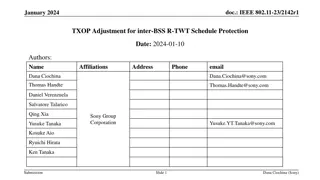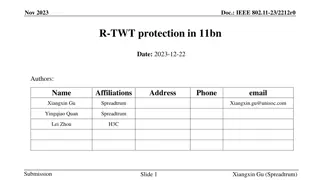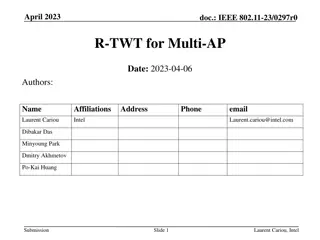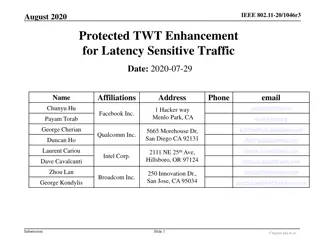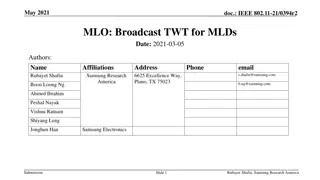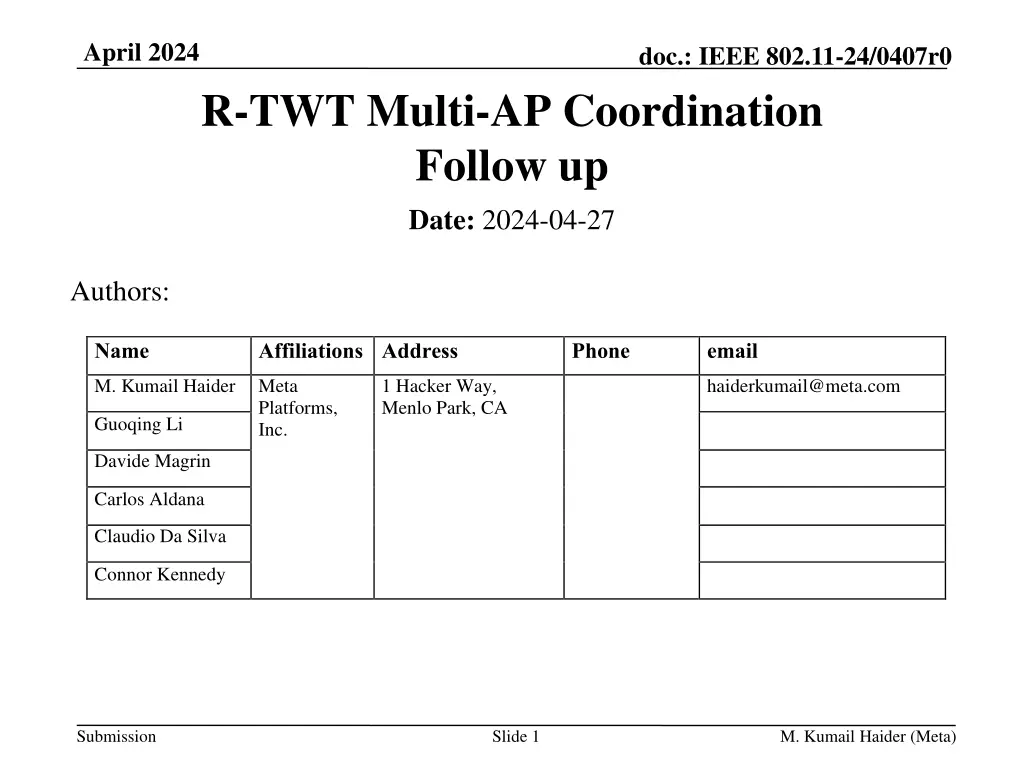
IEEE 802.11-24: Extending R-TWT for Multi-AP Deployments
Explore the design considerations for extending R-TWT operation to Multi-AP scenarios in IEEE 802.11-24. Learn about improving tail latency, jitter, and medium protection in overlapping Basic Service Sets (OBSSs). Discussions include R-TWT operation in 802.11be, coordination among neighboring BSSs, and APs sharing schedules for enhanced protection in OBSS scenarios.
Download Presentation

Please find below an Image/Link to download the presentation.
The content on the website is provided AS IS for your information and personal use only. It may not be sold, licensed, or shared on other websites without obtaining consent from the author. If you encounter any issues during the download, it is possible that the publisher has removed the file from their server.
You are allowed to download the files provided on this website for personal or commercial use, subject to the condition that they are used lawfully. All files are the property of their respective owners.
The content on the website is provided AS IS for your information and personal use only. It may not be sold, licensed, or shared on other websites without obtaining consent from the author.
E N D
Presentation Transcript
April 2024 doc.: IEEE 802.11-24/0407r0 R-TWT Multi-AP Coordination Follow up Date: 2024-04-27 Authors: Name Affiliations Address Phone email M. Kumail Haider Meta Platforms, Inc. 1 Hacker Way, Menlo Park, CA haiderkumail@meta.com Guoqing Li Davide Magrin Carlos Aldana Claudio Da Silva Connor Kennedy Submission Slide 1 M. Kumail Haider (Meta)
April 2024 doc.: IEEE 802.11-24/0407r0 Problem Statement 802.11bn is aiming for improving tail latency and jitter compared to 802.11be including scenarios of overlapping Basic Service Sets (OBSSs) R-TWT is a suitable candidate from 802.11be for providing enhanced medium protection and predictable latency for low latency applications Coordination among neighboring BSSs can provide enhanced protection in OBSS scenarios This document explores design considerations for extending R-TWT operation to Multi-AP scenarios Submission Slide 2 M. Kumail Haider (Meta)
April 2024 doc.: IEEE 802.11-24/0407r0 Recap: R-TWT Operation in 802.11be Uses broadcast TWT (802.11ax) signaling as baseline, with enhancements AP advertises R-TWT schedules via TWT element in Management frames in the BSS (e.g., Beacon, Probe response) Indication of R-TWT UL/DL TIDs during membership setup to identify latency sensitive traffic Provides enhanced medium access protection and provisions for predictable latency R-TWT supporting STAs must end any TXOP at SP start boundary Optional usage of overlapping quiet intervals to limit interference from legacy (non-EHT) devices Prioritization of traffic belonging to R-TWT UL/DL TIDs per membership Spec recommends membership negotiated as Trigger-enabled for efficient medium access Submission Slide 3 M. Kumail Haider (Meta)
April 2024 Next: Extending R-TWT for Multi-AP deployments in UHR doc.: IEEE 802.11-24/0407r0 Several contributions in TGbn have discussed R-TWT enhancements with multi-AP coordination 11-23/1887r0: Coordinated Medium Access for Multi-AP Deployments, Giovanni Chisci (Qualcomm) et.al. 11-23/1953r0: Coordinated R-TWT for Multi-AP scenarios - Follow up, Liuming Lu (OPPO) et.al. 11-23/2084r0: Enhanced R-TWT for UHR, Jeongki Kim (Ofinno) et.al. 11-23/1932r3: Further considerations on coordinated TWT, Rubayet Shafin (Samsung Research) et.al. 11-23/2022r0: r-TWT for multi-AP follow up, Laurent Cariou (Intel) et.al. 11-23/2212r0: R-TWT-protection-in-11bn, Xiangxin Gu (Spreadtrum) et.al. 11-24/0388r0: Impact of Network Topology on Coordinated R-TWT, Qing Xia (Sony) et.al. 11-24/0161r0: R-TWT Announcement in Multi-BSS, Sunhee Baek (LGE) et.al. This contribution shares our view and further discussion on this topic Submission Slide 4 M. Kumail Haider (Meta)
April 2024 doc.: IEEE 802.11-24/0407r0 APs sharing schedules for coordination Neighboring APs may learn an AP s schedules (bTWT/R-TWT) via beacons Advantage: No new explicit signaling is required between APs to share schedules Drawback: Schedule coordination is limited to already advertised schedules in an AP s BSS Drawback: Less flexibility, e.g., an AP may not be looking to coordinate on all its schedules We believe APs should be able to share schedules in unicast frames between them, besides advertising in beacons (default) Signaling can be unified with other AP coordination mechanisms Schedule information may be carried in dedicated IE (e.g., TWT element). Besides schedules, other coordination information may also be indicated Submission Slide 5 M. Kumail Haider (Meta)
April 2024 doc.: IEEE 802.11-24/0407r0 TWT element for schedule sharing We have to use existing method of R-TWT schedule advertisements (at least of AP s own schedules) via TWT element in beacons for backward compatibility For schedule sharing between APs in unicast frames, TWT element is not the most efficient container as currently defined (R-/b-/i-) TWT parameter set fields contain several fields for operation within the BSS (and between AP/STA) and are not relevant for AP schedule sharing/coordination (e.g., R-TWT TIDs, broadcast TWT recommendation, schedule IDs etc.) We should greatly simplify the TWT parameter set fields when used for multi-AP coordination. Only critical fields to define a schedule should be included (e.g., start time, schedule interval, SP duration). Additional coordination information may also be signaled It is also possible to define a new element for schedule sharing. Submission Slide 6 M. Kumail Haider (Meta)
April 2024 Should coordination be limited to existing R- TWT schedules in respective BSSs? No doc.: IEEE 802.11-24/0407r0 If we strictly rely on passive learning of OBSS schedules via beacon frames, only R- TWT schedules announced by the AP and in effect in its BSS are candidates for coordination If sharing schedules with a neighboring AP via individually addressed frames (or other new signaling we define), an AP should not be required to only share existing schedules it is advertising as R-TWT schedules in its own BSS. Scenario 1: AP wants to coordinate on only a subset of its schedules Scenario 2: AP doesn t have any R-TWT supporting STAs associated, or no R- TWT schedules are in effect. However, there are other schedules that the AP wants to coordinate on and setup enhanced protection for. For example, b-TWT or i-TWT schedules or other periodic service intervals (e.g., via SCS negotiations) Scenario 3: AP wants to consolidate multiple schedules from its BSS and represent them as a single schedule to neighboring APs for more efficient/simplistic coordination Scenario 4: AP wants to setup a new coordinated/multi-AP schedule (further discussion on slide 10) Submission Slide 7 M. Kumail Haider (Meta)
April 2024 doc.: IEEE 802.11-24/0407r0 Rules for APs for schedule coordination An AP should not be required to advertise a neighboring AP s schedule in its own BSS An AP may not have any R-TWT supporting STAs associated with it. This will result in unnecessary overhead of announcement. We should give flexibility to APs about the level at which they want to coordinate and protections they want to provide to a neighboring AP s schedules (level of coordination is matter of mutual agreement/negotiation) Rules for shared APs may depend on level of coordination, and we should allow multiple levels of coordination for flexibility Level 1: Shared AP considers Sharing AP s schedule when devising its own schedules (or operating in its BSS) to minimize interference Level 2: Shared AP ends its TXOP at SP start boundary of Sharing AP s schedules SPs Level 3: Shared AP advertises Sharing AP s schedules in its own BSS. It is TBD whether Shared AP s associated STAs may request membership in these schedules. Both modes may be allowed. Submission Slide 8 M. Kumail Haider (Meta)
April 2024 doc.: IEEE 802.11-24/0407r0 Do we need new requirements at STAs? No R-TWT in 11be provides an ample solution for traffic prioritization and medium protection within a BSS where all STAs support R-TWT Even when other STAs don t support R-TWT, DL and UL flows of R-TWT scheduled STA benefit from traffic prioritization (refer to simulation results in 11- 21/1990r1) EHT STAs supporting R-TWT should be compatible with multi-AP R-TWT framework We believe that additional new protection/prioritization rules for R-TWT STA operation are not strictly required when extending to Multi-AP framework Provisions may be added to enhance signaling and/or add more context for STAs (e.g., types of schedules) while maintaining backward compatibility with EHT STAs (when using R-TWT within an AP s BSS) Submission Slide 9 M. Kumail Haider (Meta)
April 2024 doc.: IEEE 802.11-24/0407r0 Types of coordinated schedules 1. OBSS schedules: Schedules originate in a neighboring AP s BSS Level 1: Shared APs inform their scheduling to minimize interference with OBSS schedules (e.g., by devising non-overlapping schedules in their own BSS where possible) Level 2: Shared APs end their TXOP at SP start boundary (optional enhanced protection) Level 3: Shared APs advertise OBSS schedules as R-TWT schedules in their own BSS (optional, highest level protection). Non-interfering transmissions may still happen within the BSS (spatial reuse) Fig: Example of R-TWT schedule coordination where AP2 advertises AP1 s schedule in its BSS Submission Slide 10 M. Kumail Haider (Meta)
April 2024 doc.: IEEE 802.11-24/0407r0 Types of coordinated schedules 1. OBSS schedules: Schedules originate in a neighboring AP s BSS Level 1: Shared APs inform their scheduling to minimize interference with OBSS schedules (e.g., by devising non-overlapping schedules in their own BSS where possible) Level 2: Shared APs end their TXOP at SP start boundary (optional enhanced protection) Level 3: Shared APs advertise OBSS schedules as R-TWT schedules in their own BSS (optional, highest level protection). Non-interfering transmissions may still happen within the BSS (spatial reuse) Multi BSS schedules: APs may devise and announce coordinated schedules Reduces number of schedules being advertised/devised Schedule has the same TWT parameters (e.g., start time, period) and advertised in respective BSSs (duration may be same or different) STAs from multiple BSS may be members of this schedule (negotiated with respective APs) Requires signaling via unicast frames between APs for schedule negotiation (or via backhaul) TXOP-level coordination and enhanced spatial reuse within SPs for efficient medium utilization is possible 2. Submission Slide 11 M. Kumail Haider (Meta)
April 2024 doc.: IEEE 802.11-24/0407r0 Conclusion We introduced concepts and solutions for R-TWT schedule coordination between multiple APs in neighboring BSS to enhance R- TWT operation in UHR Different levels of schedule coordination may be used, with increasing degree of protections/provisions, as per negotiation between APs Existing and new signaling for advertisement of such schedules between APs and between AP and their associated STAs is discussed Extending R-TWT operation for multi-AP coordination will facilitate in mitigating OBSS interference during SPs Submission M. Kumail Haider (Meta) Slide 12
April 2024 doc.: IEEE 802.11-24/0407r0 SP1 Do you agree to define mechanisms that enable APs to coordinate R-TWT schedules and/or mechanisms that enable one AP to extend the SP start time protection of the R-TWT schedule of the other AP. NOTE TBD mechanisms may be defined for two APs to share schedules and negotiate rules to follow when coordinating R-TWT schedules Submission M. Kumail Haider (Meta) Slide 13
April 2024 doc.: IEEE 802.11-24/0407r0 SP2 Do you agree that, if an AP extends the SP start time protection of an R-TWT schedule that it coordinates with another AP (via TBD negotiation mechanisms), then: The AP shall ensure its TXOP ends before the start time of the coordinated R-TWT schedule. The AP may advertise (depending on the rules negotiated by the two APs) in the beacon frames it transmits the coordinated R-TWT schedule so that its associated STAs supporting R-TWT also end their TXOP at SP start boundary for further protection. - NOTE: The coordinated schedule may result from a first AP sharing an R-TWT schedule with a second AP as is, or the two APs may negotiate the parameters of the schedule via TBD mechanisms Submission M. Kumail Haider (Meta) Slide 14


